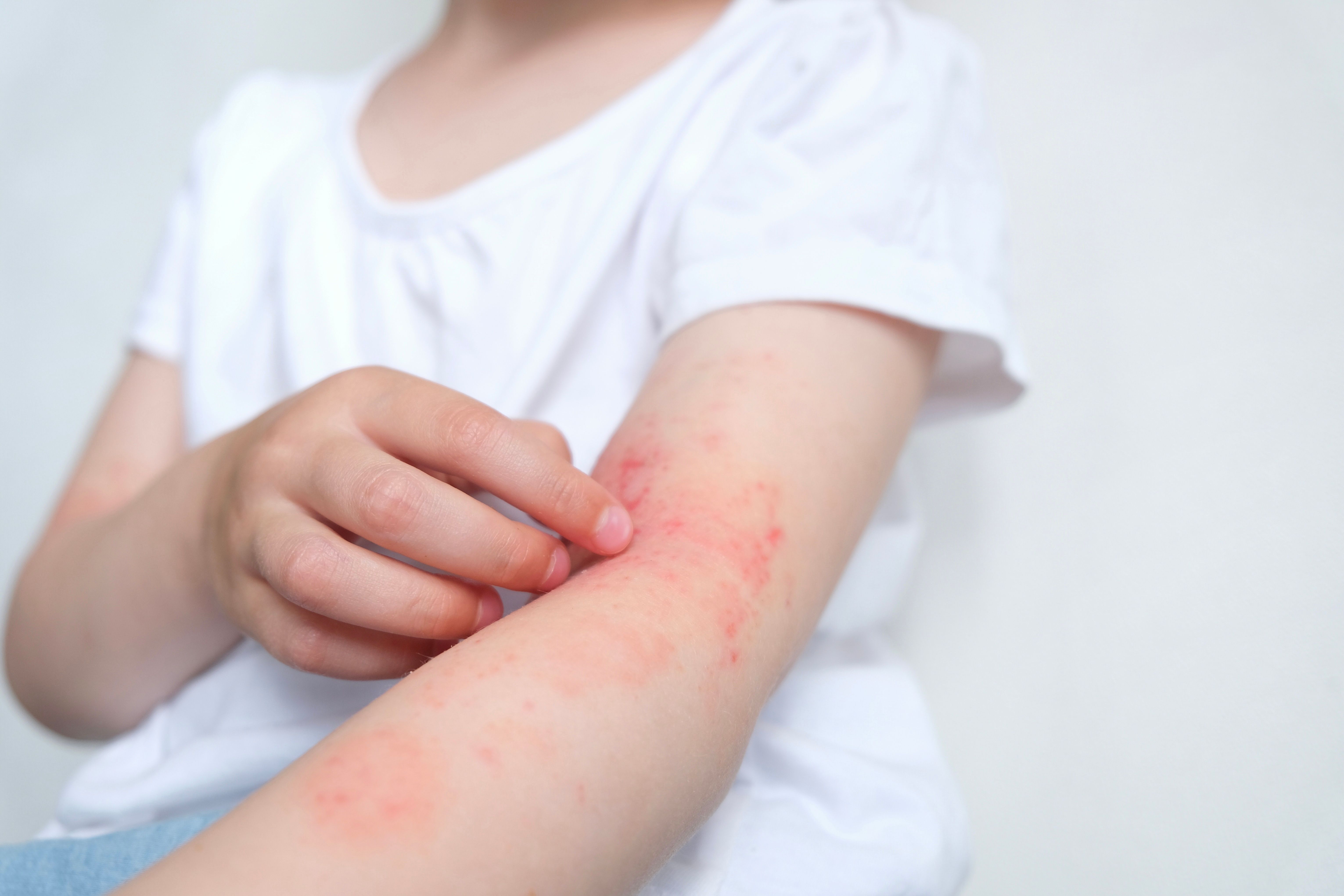Roflumilast cream 0.15% reduces itch for atopic dermatitis patients 6 years and older
In identical phase 3 trials, roflumilast demonstrated topline positive results, reducing itch in children and adults with mild to moderate AD.
Roflumilast cream 0.15% reduces itch for atopic dermatitis patients | Image Credit: © Марина Терехова - © Марина Терехова - stock.adobe.com

Roflumilast cream 0.15% (Arcutis) met both primary and key secondary endpoints in identical phase 3 trials, reducing itch for atopic dermatitis(AD) in patients 6 years and older, according to a press release from Arcutis Biotherapeutics, Inc.
Roflumilast cream is a once-daily, steroid-free topical formulation of a highly potent and selective phosphodiesterase-4 (PDE4) inhibitor, according to Arcutis. In the studies, roflumilast demonstrated itch reduction as early as 24 hours after the first application for patients with mild to moderate AD during 2 phase 3 trials (INTEGUMENT-1; INTEGUMENT-2).
A total of 1337 randomized patients aged 6 years and older with mild to moderate AD (body surface area equal or greater than 3%) participated in the identical phase 3, parallel-group, double-blind, and vehicle-controlled studies.
Each study met its primary endpoint of IGA success, defined as a validated Investigator Global Assessment–Atopic Dermatitis (vIGA-AD) score of clear (0) or almost clear (1), plus a 2-grade improvement from baseline at week 4 in each study,(INTEGUMENT-1: 32% roflumilast cream vs 15.2% vehicle [P < 0.0001]) and (INTEGUMENT-2: 28.9% roflumilast cream vs 12% vehicle [P < 0.0001]).
Improvements in v-IGA success were also demonstrated as early as week 2, (INTEGUMENT-1: 21.2% roflumilast cream vs 6.4% vehicle [P< 0.0001]) and (INTEGUMENT-2: 17.7% roflumilast cream vs 5.3% vehicle [P < 0.0001]).
Ultimately, results from the studies revealed roflumilast demonstrated safety and tolerability while improving AD symptoms across multiple efficacy endpoints.
“Pruritus, or itch, is the most reported and most burdensome symptom, and may cause substantially reduced quality of life and sleep disturbances,” said Lawrence F. Eichenfield, MD, chief of pediatric and adolescent dermatology at Rady Children’s Hospital, San Diego, California, professor of dermatology and pediatrics and vice-chair of the Department of Dermatology at UC San Diego School of Medicine, and study investigator. “Importantly, individuals treated with roflumilast cream experienced a significant and rapid improvement in the extent and severity of their atopic dermatitis, adding further to evidence of the potential of roflumilast cream as a treatment option for this disease. Additionally, these pivotal phase 3 data show that roflumilast cream drove a significant and rapid reduction in itch as early as the first 24 hours, which could be a helpful early indication to children and adults that the treatment is working.”
Roflumilast demonstrated significant improvements on key secondary endpoints compared to vehicle. Of patients treated with roflumilast cream in each study, over 30% achieved Worst Itch Numeric Scale (WI-NRS) success at week 4. Additionally, those treated with roflumilast saw daily improvement in itch, with a significant improvement at 24 hours after first application (P < 0.05).
More than 40% of adults and children aged 6 years and older treated with roflumilast cream achieved a 75% reduction according to the Eczema Area and Severity Index (EASI-75)at week 4,(INTEGUMENT-1: 43.2% vs 22% [P< 0.0001]) and (INTEGUMENT-2: 42% vs 19.7% [P< 0.0001]).
In both studies, improvements in EASI-75 were observed as early as week 1 compared to vehicle, (INTEGUMENT-1: 14% vs 5.5% [p = 0.0006]) and (INTEGUMENT-2: 13.3% vs 7.8% [p = 0.0329]).
Approximately 40% of children and adults using roflumilast cream achieved a vIGA-AD score of 0 or 1 at week 4, (INTEGUMENT-1: 41.5% vs 25.2% [P < 0.0001]) and (INTEGUMENT-2: 39% vs 16.9% [P < 0.001]).
The incidence of Treatment Emergent Adverse Events (TEAEs) for the study in both active treatment and vehicle arms was low. Most TEAEs were assessed as mild to moderate in severity, with no adverse events occurring in more than 3.5% of participants in either arm.
The most common TEAEs in roflumilast-treated patients were more than 2% and included headache, nausea, and application site pain. With more than 90% of patients treated with roflumilast reporting no or mild sensation across arms in both trials and any time point, local tolerability was favorable.
Reference
Arcutis presents late-breaking data from the INTEGUMENT phase 3 trials in atopic dermatitis at American Academy of Dermatology Annual Meeting. Arcutis. March 18, 2023. Accessed March 22, 2023. https://www.arcutis.com/arcutis-presents-late-breaking-data-from-the-integument-phase-3-trials-in-atopic-dermatitis-at-american-academy-of-dermatology-annual-meeting/
Recognize & Refer: Hemangiomas in pediatrics
July 17th 2019Contemporary Pediatrics sits down exclusively with Sheila Fallon Friedlander, MD, a professor dermatology and pediatrics, to discuss the one key condition for which she believes community pediatricians should be especially aware-hemangiomas.